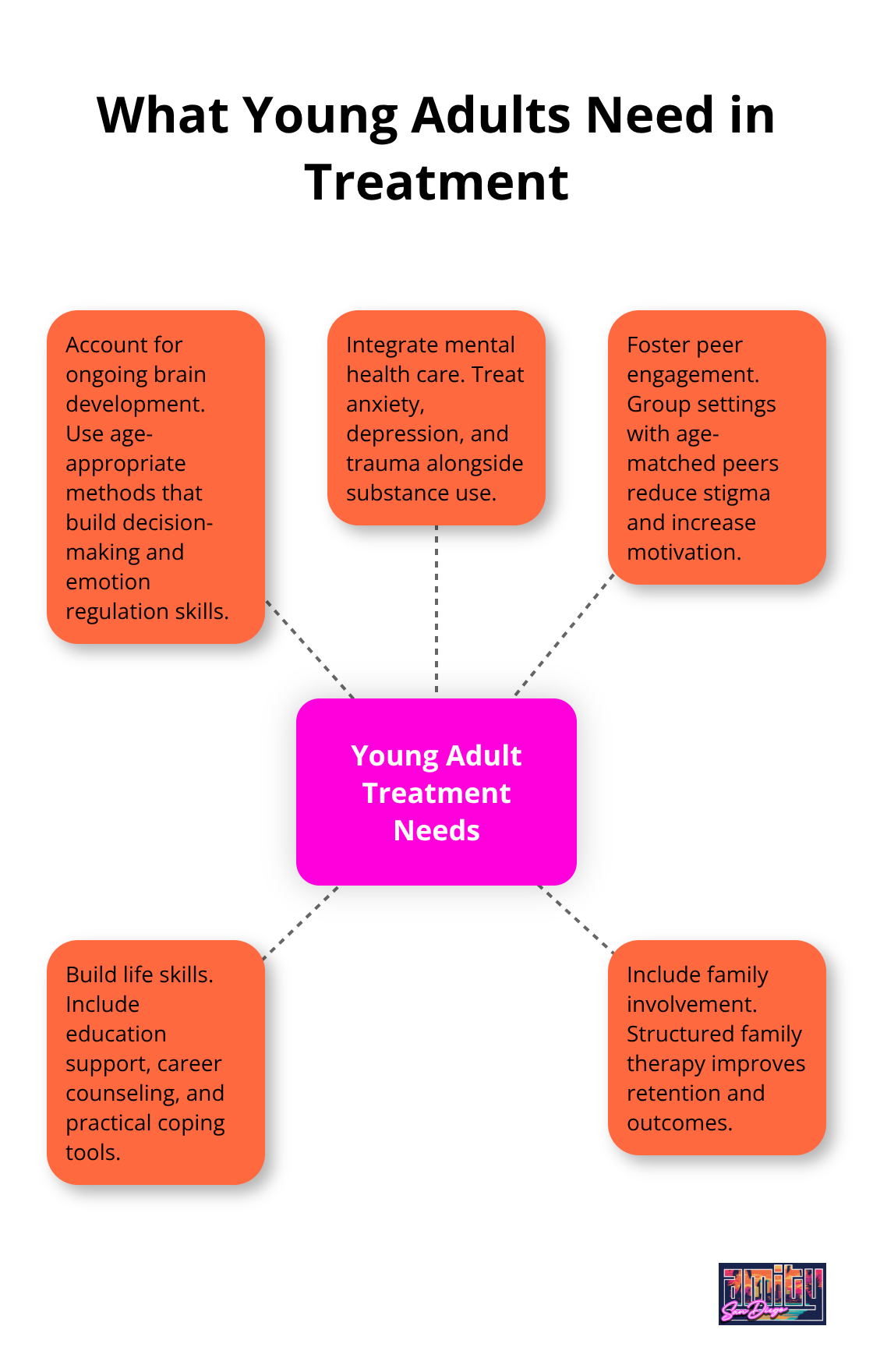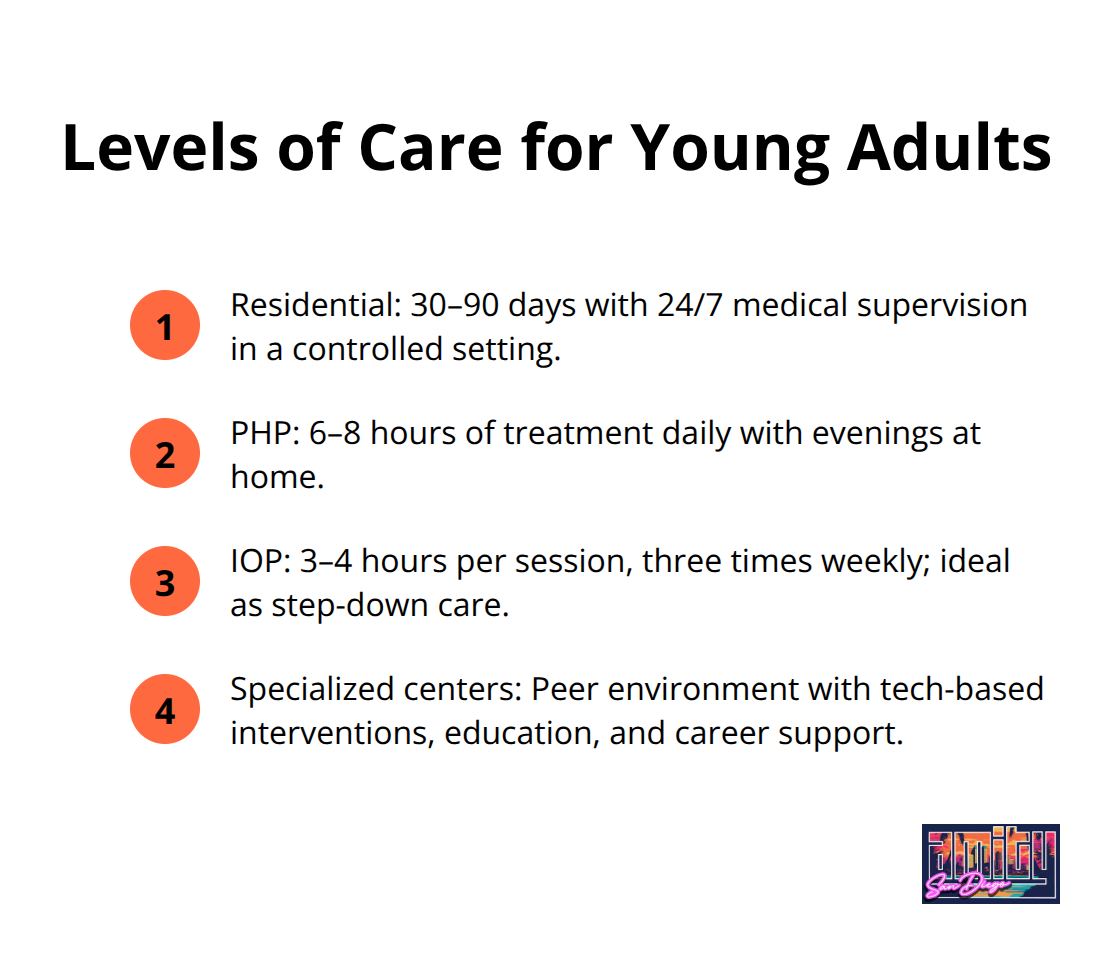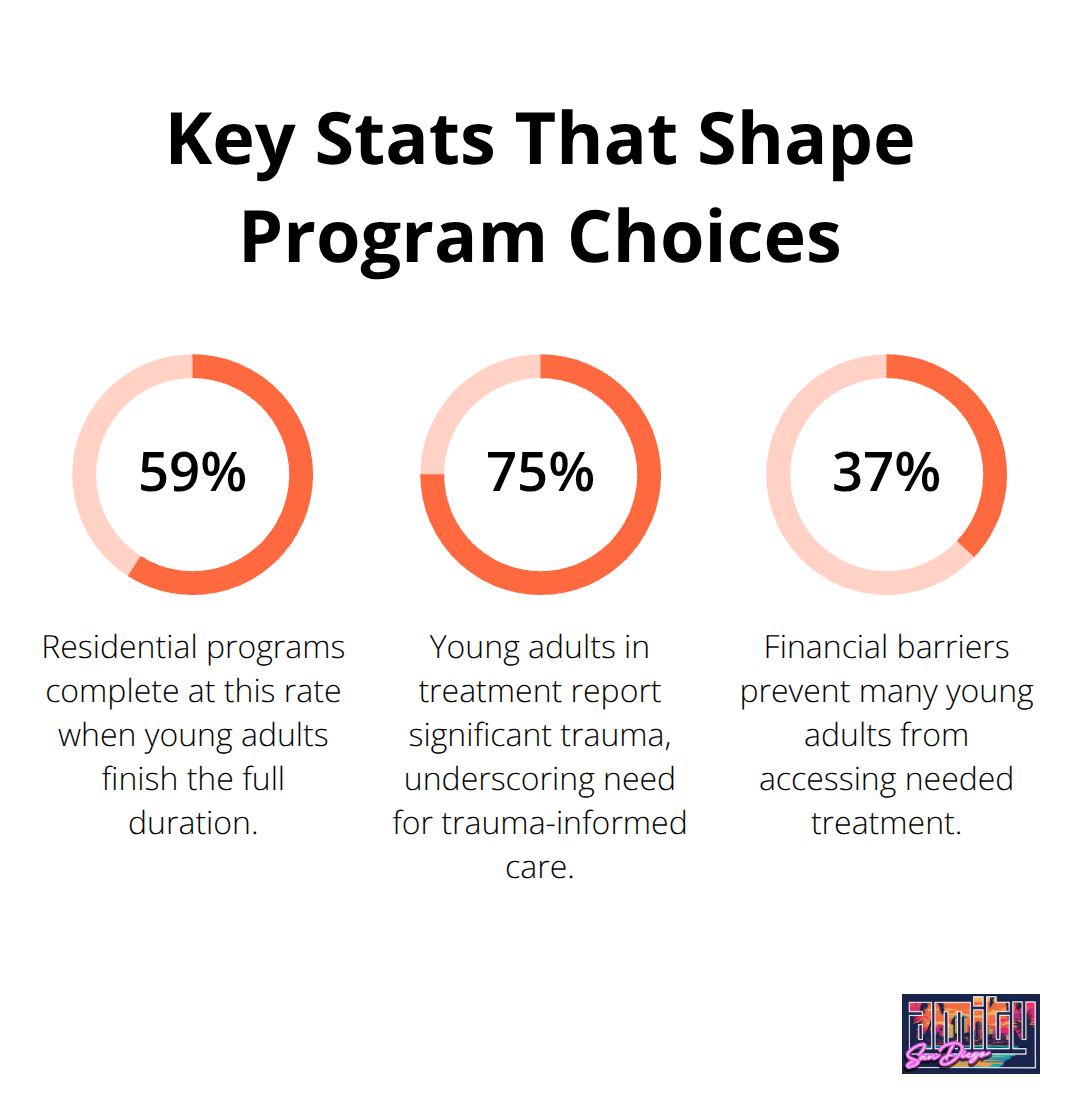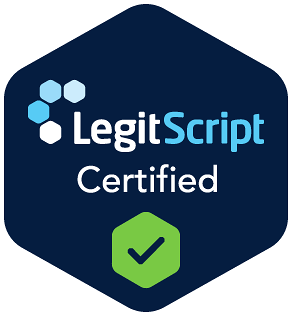Young adults face distinct challenges when battling addiction, requiring specialized approaches that traditional programs often miss. The 18-25 age group experiences unique developmental pressures, from college stress to career uncertainty.
We at Amity San Diego understand that finding effective drug treatment programs for young adults requires careful consideration of these specific needs. The right program can make the difference between lasting recovery and repeated relapses.
Why Young Adults Need Different Treatment Approaches
Young adults aged 18-25 represent the highest-risk group for substance abuse, with adolescent substance use continuing to hold steady below pre-pandemic levels reported in 2020. This demographic faces unprecedented challenges that traditional adult programs fail to address effectively. College pressures, identity formation, financial independence struggles, and social media comparisons create a perfect storm for addiction development.
Brain Development Creates Unique Vulnerabilities
The prefrontal cortex, responsible for decision-making and impulse control, remains underdeveloped in young adults until age 25. This biological reality means standard treatment approaches designed for fully mature adults often miss the mark. Young adults require programs that account for their heightened emotional reactivity and limited life experience. Treatment centers report significantly better outcomes when programs incorporate age-appropriate therapeutic techniques that work with, rather than against, these developmental realities.

Mental Health Complications Demand Integrated Care
Co-occurring disorders affect young adults who seek treatment, with anxiety and depression being the most common combinations. The transition to independence often triggers underlying mental health conditions that family support systems previously masked. Young adults frequently self-medicate with substances to manage untreated trauma, academic stress, or social anxiety, making dual-diagnosis treatment essential for this population.
Traditional Programs Miss the Mark
Standard adult treatment programs assume emotional maturity and life stability that most young adults lack. These programs often emphasize long-term consequences that feel abstract to developing brains focused on immediate rewards. Young adults need treatment environments that acknowledge their developmental stage while building the skills they need for independent recovery. Programs that treat addiction without addressing underlying mental health issues see relapse rates around 40-60% early on, though this risk drops dramatically over time.
The next step involves understanding the specific types of treatment programs available and how they can address these unique developmental needs. For those seeking comprehensive care, addiction treatment San Diego offers specialized programs designed for young adults.
What Treatment Options Work Best for Young Adults
Residential Programs Provide Structure When Chaos Rules
Inpatient residential treatment offers the highest level of care for young adults who struggle with severe addiction. These programs typically last 30-90 days and provide 24-hour medical supervision in a controlled environment. Research shows that residential programs demonstrate treatment completion rates of approximately 59% when young adults complete the full program duration.
These facilities remove young adults from environments where substance use occurs, which breaks destructive patterns while they build new coping mechanisms. Residential programs work best for young adults with multiple failed outpatient attempts, severe withdrawal symptoms, or co-occurring mental health conditions that require intensive medical management.

Outpatient Programs Balance Recovery with Real Life
Partial Hospitalization Programs deliver intensive treatment for 6-8 hours daily while they allow young adults to return home each evening. PHP programs work particularly well for college students or young professionals who cannot leave their responsibilities for extended periods.
Intensive Outpatient Programs require 3-4 hours of treatment three times weekly, which makes them ideal for young adults who transition from higher levels of care. The Substance Abuse and Mental Health Services Administration provides comprehensive data on treatment outcomes, showing that young adults in outpatient programs maintain employment or education at higher rates than those in residential care.
Specialized Centers Target Age-Specific Challenges
Treatment centers designed specifically for young adults create peer environments that enhance engagement and reduce stigma. These programs incorporate technology-based interventions, career counseling, and educational support that traditional adult programs overlook.
Young adult-focused centers report higher completion rates than general population programs according to recent treatment outcome studies. These facilities often include life skills training, financial literacy education, and social media awareness components that address modern challenges this demographic faces.
The success of any treatment program depends heavily on how well it matches the individual’s specific needs and circumstances. This makes the evaluation process absolutely critical for long-term recovery success. For those seeking comprehensive care, consider exploring addiction treatment San Diego options that specialize in young adult recovery.
Which Program Fits Your Situation
Insurance Coverage Determines Your Real Options
Insurance verification should be your first step, not your last. Most major insurance providers cover addiction treatment, but coverage varies dramatically between plans. Aetna, Blue Cross Blue Shield, and Cigna typically cover 80-90% of outpatient treatment costs after deductibles, while some plans limit residential stays to 30 days maximum. Contact your insurance company directly to understand your out-of-network benefits, as many specialized young adult programs operate outside traditional networks.

Private pay options range from $15,000-$30,000 monthly for residential care, while intensive outpatient programs cost $3,000-$8,000 monthly. Many families assume they cannot afford treatment, but payment plans and sliding scale fees make quality care accessible. The National Survey on Drug Use and Health found that financial barriers prevent 37% of young adults from accessing needed treatment (making insurance verification absolutely essential).
Location Impacts Family Involvement and Long-Term Success
Treatment location affects recovery outcomes more than most families realize. Programs within driving distance allow family participation in therapy sessions, which research shows significantly improves treatment outcomes. Young adults benefit from family involvement, but they also need independence to develop recovery skills.
Out-of-state programs remove young adults from triggering environments but can isolate them from support systems. California treatment centers report higher retention rates for local residents compared to out-of-state patients. Consider your young adult’s specific triggers when choosing location. Those with college-based addiction patterns often benefit from programs away from campus environments, while family relationship issues might require local treatment with intensive family therapy components.
Evidence-Based Approaches Separate Effective Programs from Marketing
Cognitive Behavioral Therapy and Dialectical Behavior Therapy demonstrate the strongest outcomes for young adults with substance use disorders. Programs should offer both individual and group therapy components, as peer interaction significantly enhances motivation in this age group. Medication-assisted treatment availability is non-negotiable for opioid use disorders, with studies showing median retention rates of 56.8% at six months.
Avoid programs that rely heavily on confrontational techniques or shame-based interventions, which backfire with young adults. Look for trauma-informed care certification, as 75% of young adults in treatment have experienced significant trauma. Programs should provide concrete life skills training, career counseling, and educational support rather than focusing solely on abstinence. The most effective programs combine medical intervention, psychological therapy, and practical life preparation in integrated treatment plans.
Program Structure Must Match Individual Needs
Young adults respond better to flexible program structures that accommodate their developmental stage. Programs with rigid schedules often fail because they don’t account for the chaos that characterizes this life phase. Look for treatment centers that offer multiple start dates throughout the month rather than fixed admission schedules.
The most successful programs balance structure with autonomy (allowing young adults to practice decision-making skills in a safe environment). Programs should include educational components about addiction science, as young adults respond well to understanding the “why” behind their treatment. Group sizes matter significantly – smaller groups of 8-12 participants allow for more personalized attention and stronger peer connections than larger institutional settings. For comprehensive support, consider addiction treatment San Diego options that specialize in young adult care.
Final Thoughts
The right drug treatment programs for young adults prioritize age-appropriate care, evidence-based approaches, and verified insurance coverage. Programs that understand the developmental needs of 18-25 year olds produce better outcomes than generic adult facilities. The National Institute on Drug Abuse confirms that early intervention reduces long-term addiction severity significantly.
Time matters when addiction strikes your family. Every day spent researching perfect options allows addiction to strengthen its hold. Start with insurance verification, then contact three specialized programs within 48 hours of recognizing the problem (the 988 Lifeline provides immediate crisis support and local resource connections).
We at Amity San Diego provide free confidential assessments and insurance verification to remove barriers between recognition and action. Our specialized outpatient programs accommodate work, school, and family responsibilities while delivering intensive support for lasting recovery. Contact us today to explore addiction treatment San Diego options designed specifically for young adults.



